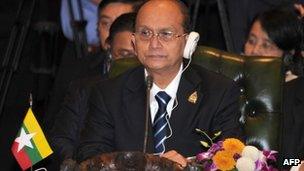Asean leaders approve Burma chairmanship bid
- Published
- comments

Burma missed out on its last opportunity to chair Asean because of its rights record
Leaders of the Association of Southeast Asian Nations (Asean) have agreed that Burma can chair the regional bloc in 2014, amid some signs of reform in the country.
The move came at a summit of the 10-member group in Indonesia.
Indonesian Foreign Minister Marty Natalegawa told the BBC the decision was unanimous.
He said member states believed that Burma had made significant progress down the path of democracy.
The announcement came as Burma's pro-democracy party appeared poised to rejoin the country's political process.
'Growing'
The leadership of the Asean regional grouping rotates on an annual basis, but Burma was not allowed to take the top position last time because of its human rights record.
Some critics say it is still too early to award the high-profile role to Burma, where between 600 and 1,000 political prisoners are thought to remain behind bars.
But Mr Natalegawa said it was important to recognise that the situation had changed.
"It's not about the past, it's about the future, what leaders are doing now," he said. "We're trying to ensure the process of change continues."
Ko Ko Hlaing, chief political adviser to the Burmese president, said Asean had welcomed Burma as a responsible leader.
"Be assured that we are now growing into a democratic society and we will do all our responsibilities and duties as a responsible government, reflecting the desires of the Myanmar (Burmese) people," he said.
But US President Barack Obama, speaking before the decision was announced, said more was needed from Burma.
"Some political prisoners have been released. The government has begun a dialogue. Still, violations of human rights persist," he said in a speech to the Australian parliament.
"So we will continue to speak clearly about the steps that must be taken for the government of Burma to have a better relationship with the United States."
Burma held its first elections in two decades a year ago - polls which saw military rule replaced with a military-backed civilian-led government.
The new leadership then freed pro-democracy leader Aung San Suu Kyi from house arrest and has opened dialogue with her.
Aung San Suu Kyi explains the views of some within her party about whether or not they should re-enter politics
Her National League for Democracy party is to meet on Friday to decide whether to rejoin the political process.
It boycotted the 2010 polls because of electoral laws that banned its leaders - former political prisoners - from standing as candidates.
This law and another that required registered parties to "safeguard" the military-written constitution have now been changed.
Ms Suu Kyi told the BBC she expected most of her party to support a decision to run in forthcoming by-elections.